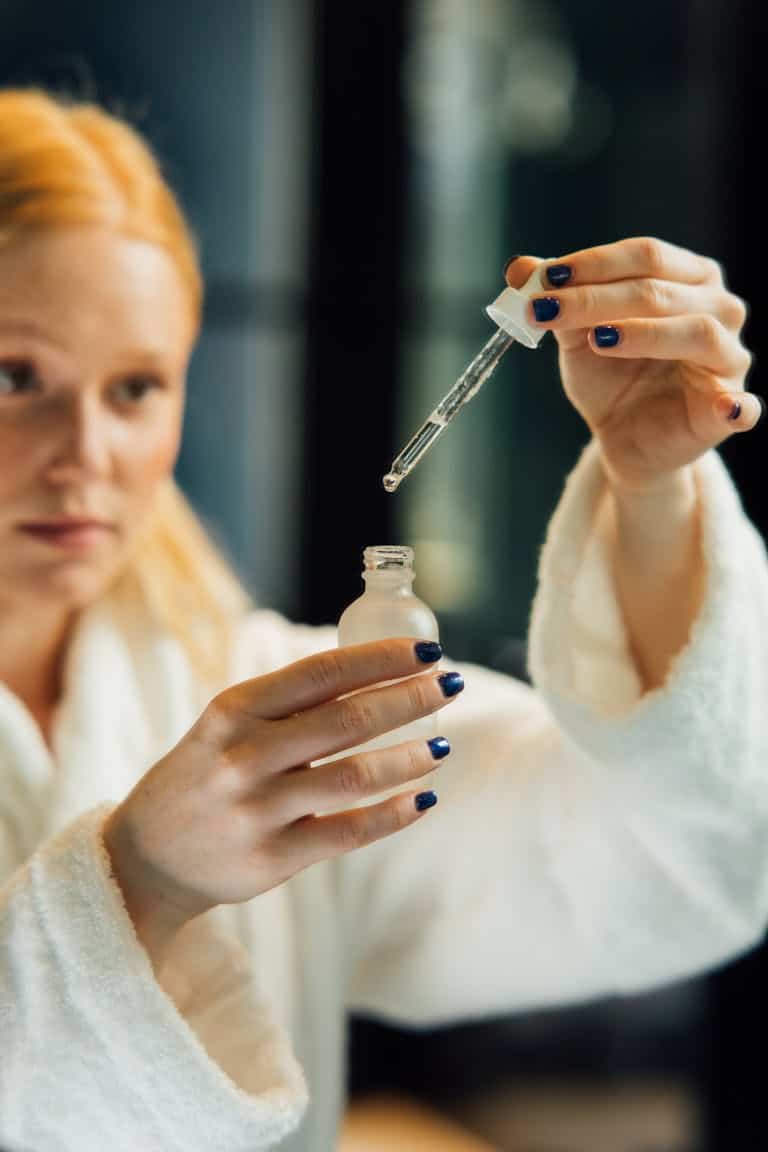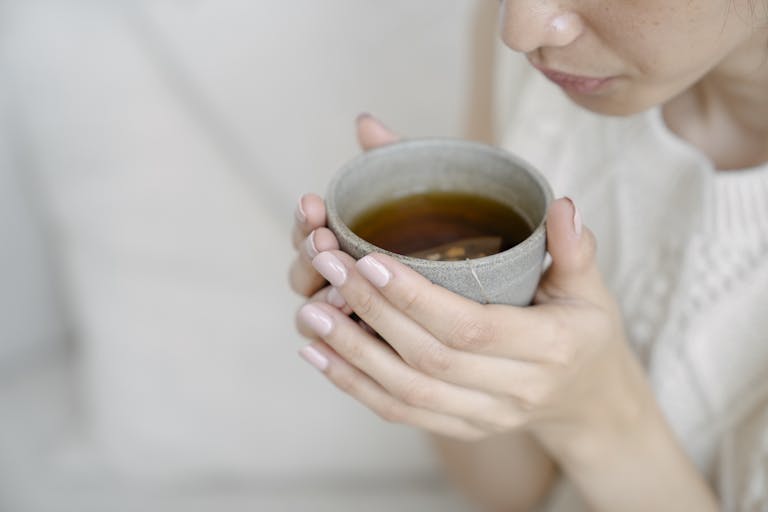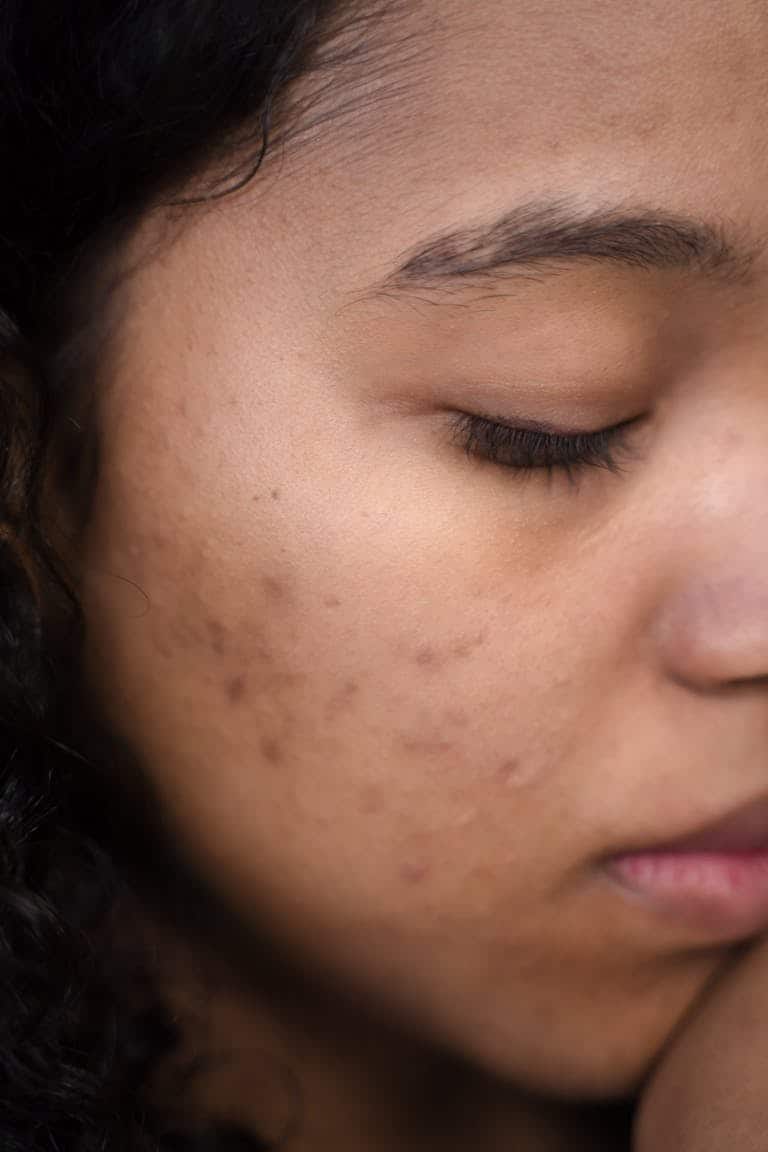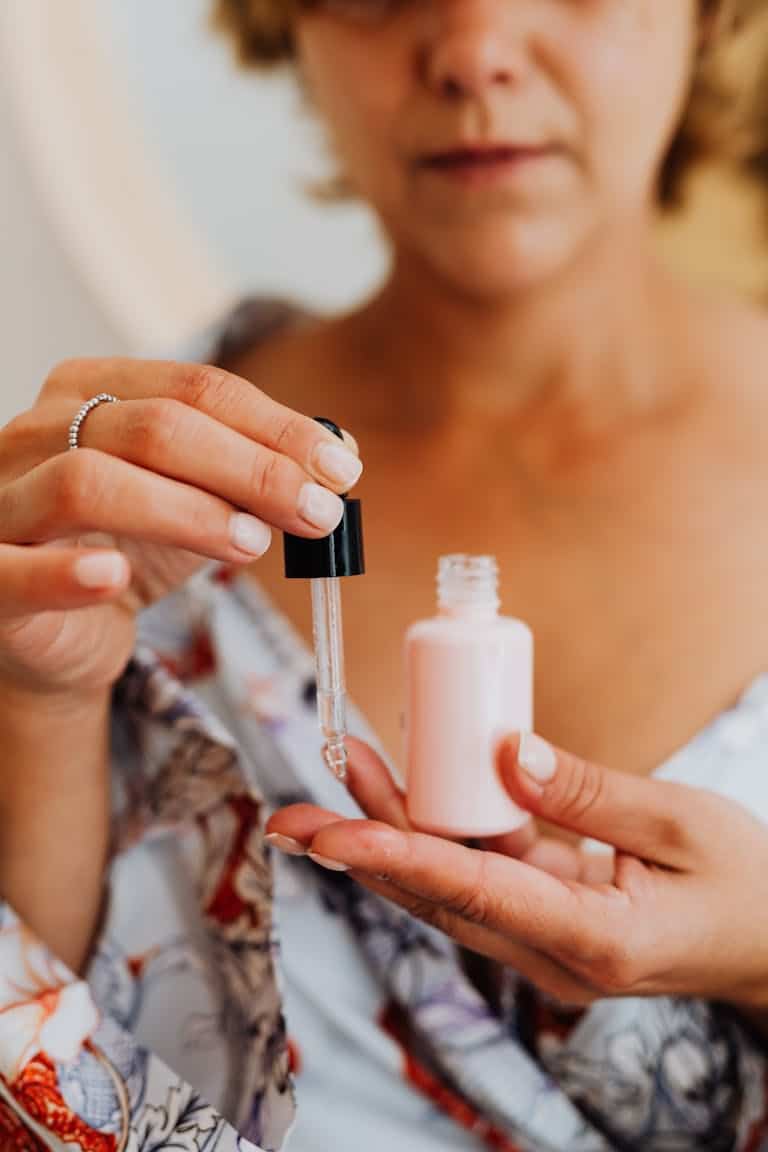Mindfulness in Perimenopause: Why It Matters Now
Perimenopause is weird. One day, you wake up and your skin feels fine. The next, it’s dry, sensitive, maybe a little blotchy, and no amount of moisturizer seems to help. Your moods feel sharper, your sleep patchy, and somehow, everything feels just a little harder.
Mindfulness isn’t a magic fix. You don’t need to sit cross-legged for an hour—or even at all. It’s really just about noticing what’s happening right now, without judging yourself for it. Paying attention to your breath, your body, or even the moment you’re in while washing your face. That’s it.
And here’s the interesting part: there’s science behind it. Studies show that short, regular mindfulness practices can lower cortisol—the stress hormone that messes with your skin, your sleep, and basically everything else. People who practice mindfulness regularly report calmer moods, better sleep, and even fewer stress-related skin flare-ups.
Think of it as a little pause button for your nervous system. You don’t need a perfect routine, fancy apps, or a meditation cushion. A few moments here and there can make a difference. And during perimenopause, that’s worth noticing.

How Stress Affects Skin in Perimenopause
We know hormones shift during perimenopause, and that alone can affect collagen production, hydration, and sensitivity. But stress is the hidden accelerator. When your body releases cortisol in response to stress, a few things happen:
- Inflammation increases: You might notice more redness, flushing, or irritation.
- Collagen breakdown speeds up: Fine lines may appear more quickly.
- Skin repair slows down: Cuts or blemishes take longer to heal.
- Sebum production fluctuates: This can lead to breakouts or oiliness where you didn’t notice it before.
Mindfulness works on the opposite side of the equation. By helping your nervous system switch into “rest and repair” mode, it lowers stress hormones, reduces inflammation, and gives your skin a chance to heal and stay resilient.
The Science of Mindfulness in Perimenopause
Mindfulness isn’t just a “feel-good” trend—it has measurable effects on the body and skin. Here’s a deeper look at what science actually shows:
- Cortisol Reduction: In one study, participants who practiced just 20 minutes of daily mindfulness meditation for eight weeks had significantly lower morning cortisol levels than a control group. Lower cortisol is directly linked to reduced stress-induced skin flare-ups, redness, and slower collagen breakdown. Chronic cortisol elevation can impair fibroblasts, the cells responsible for producing collagen, making skin thinner and more sensitive.
- Nervous System Balance: Mindfulness activates the parasympathetic nervous system, often called the “rest and repair” system. This lowers heart rate, calms the digestive system, and helps regulate hormones. A more balanced nervous system reduces oxidative stress and inflammation—both key contributors to perimenopausal skin changes like sensitivity and fine lines.
- Inflammation Control: Clinical trials show mindfulness reduces pro-inflammatory markers such as IL-6 and TNF-alpha. Inflammation drives redness, puffiness, and even breakouts, so controlling it at a biological level helps maintain smoother, calmer skin.
- Sleep Improvement: Mindfulness has been shown to increase sleep duration and depth. Deep sleep is when skin cells repair, collagen is synthesized, and hydration is restored. One study found participants practicing mindfulness-based stress reduction (MBSR) fell asleep faster, had fewer nighttime awakenings, and reported higher sleep quality—all of which support skin resilience.
- Emotional Resilience: Beyond the physical benefits, mindfulness strengthens attention and emotional regulation. Fewer reactive stress spikes mean lower cortisol surges, which in turn reduce inflammation and help skin stay calmer and less reactive.
- Additional Evidence: Emerging research also links mindfulness with improved immune function, reduced oxidative stress, and healthier microcirculation. All of these factors can subtly improve skin tone, clarity, and elasticity, especially during the hormonal shifts of perimenopause.
In short, mindfulness literally changes your body chemistry in ways that benefit both your mental well-being and your skin.
How Perimenopause Amplifies Stress—and What That Means for Your Skin
Perimenopause is more than just a shift in periods—it’s a full-body transition that can influence everything from mood and memory to your skin’s texture and glow. Hormonal fluctuations, particularly declining estrogen and progesterone, significantly affect the body’s stress response and cognitive function, which in turn have visible effects on your skin.
Hormonal Changes and the Stress Response
Estrogen plays a central role in regulating cortisol, the body’s primary stress hormone. As estrogen levels drop during perimenopause, cortisol regulation becomes less efficient, leaving many women more sensitive to stress. Research shows that perimenopausal women often exhibit heightened cortisol responses to everyday stressors compared to premenopausal women. This means that even minor daily pressures—like a full inbox or a busy morning—can trigger a stronger stress response.
Heightened cortisol doesn’t just affect mood and energy—it can accelerate skin aging. Elevated cortisol breaks down collagen, impairs skin barrier function, and promotes inflammation, contributing to dryness, fine lines, and flare-ups of conditions like eczema or acne. Essentially, your skin reflects how well (or poorly) your body is coping with stress.
Cognitive Shifts and Self-Regulation
Many women in perimenopause notice changes in memory, focus, and multitasking ability. Studies suggest that up to 60% of midlife women experience “brain fog” or difficulties with attention and verbal fluency during this phase. Combined with sleep disruptions common at this stage, these cognitive shifts can make stress harder to manage. When stress piles up, skin health can take a hit: hormonal imbalance plus mental strain creates a perfect storm for inflammation and premature aging.
The Skin Connection
Declining estrogen also directly affects skin. Estrogen is vital for maintaining collagen, elastin, and skin hydration. Lower levels mean skin can feel thinner, drier, and less resilient. Couple that with stress-driven cortisol spikes, and you may notice accelerated aging, dullness, or sensitivity. Essentially, the way your body handles stress during perimenopause is directly mirrored in your complexion.
Mindfulness and Stress Management for Radiant Skin
This is where mindfulness comes in. Practices like meditation, deep breathing, and gentle yoga have been shown to reduce cortisol levels and improve cognitive function. Research from the Center for Mindfulness at Harvard Medical School supports mindfulness interventions for stress reduction and overall well-being in midlife women. Lowering stress not only supports emotional health but also helps your skin recover and maintain its natural glow.
Incorporating mindfulness doesn’t have to be complicated. Even five minutes of focused breathing in the morning, a short yoga flow, or a mindful skincare ritual can reduce stress, calm inflammation, and promote skin repair. Treating your skincare routine as a moment of mindfulness can transform it from a simple grooming habit into a stress-reducing practice with visible benefits.
The Bottom Line
Perimenopause is a perfect storm of hormonal shifts that affect stress, cognition, and skin. By managing stress through mindfulness, improving sleep, and maintaining a targeted skincare routine, you can mitigate some of the visible effects of this transition. Your skin, mind, and overall well-being are deeply interconnected—investing in stress reduction isn’t just self-care, it’s skin care too.
Everyday Mindfulness Practices You Can Actually Do
You don’t need an hour-long session to see benefits. The key is consistency, awareness, and small, practical moments throughout the day. Here are more detailed instructions for each practice:
1. Mindful Breathing (2–5 minutes)
- Sit or stand comfortably with a straight spine.
- Place one hand on your belly and the other on your chest.
- Inhale slowly through your nose for 4 counts, hold for 2, exhale for 6.
- Notice the rise and fall of your belly, the sensation of air through your nostrils, and any subtle body shifts.
- Repeat for 2–5 minutes.
Quick Anywhere Version: Even at a stoplight, inhale deeply, exhale fully, and notice your shoulders dropping. This mini-reset lowers cortisol instantly.
2. Qigong-Inspired Standing Practice (5–7 minutes)
- Stand with feet shoulder-width apart, knees slightly bent, arms relaxed.
- Lift your chest, elongate your spine, and feel your feet grounding into the floor.
- Slowly raise your arms on the inhale, lower them on the exhale, visualizing energy flowing from your feet up through your body.
- Repeat 6–10 times, keeping your movements smooth and intentional.
Variation: Add gentle torso twists or shoulder rolls while staying mindful of your breath. This boosts circulation and encourages lymphatic drainage.
3. Body Scan Meditation (5–10 minutes)
- Lie down or sit comfortably.
- Bring attention to your toes and slowly move upward through your legs, hips, abdomen, chest, shoulders, arms, neck, and head.
- Notice sensations, tension, or temperature differences.
- Optional: gently massage tense areas, such as jaw, shoulders, or forehead, while maintaining focus on your breath.
Why it works: Releasing tension lowers stress hormones and inflammation, helping skin calm and recover naturally.
4. Mindful Eating
- Before a meal, pause and observe your food’s colors, textures, and aroma.
- Take small bites, chew slowly, and savor the taste fully.
- Place utensils down between bites to notice the act of eating.
Mini Practice: Start each meal with a single mindful bite to anchor the habit. This improves digestion and nutrient absorption—essential for skin hydration and collagen production.
5. Thai Forest Walking Meditation (5–10 minutes)
- Walk slowly and deliberately, feeling each part of your foot connect with the ground.
- Keep your gaze soft and bring attention to body movement and breathing.
- Optional: observe surrounding nature, listening to sounds or noticing subtle movements.
Indoor Variation: Walk slowly in your home or office, focusing on sensation in your feet and the rhythm of your steps.
6. Gratitude Journaling (3 minutes)
- Write down three things you’re grateful for each night.
- Optional: note one thing your body or skin did well that day.
Benefit: Cultivates emotional balance, reduces stress markers, and indirectly supports skin health.
7. Mindful Skincare
Your daily routine can become a ritual of mindfulness:
- Slow down when cleansing. Notice the water temperature, the scent of your cleanser, the texture of your skin under your fingers.
- Massage moisturizer or serum slowly into your skin, breathing deeply as you go.
Why it matters: This improves circulation, releases facial tension, and encourages a sense of calm—plus, your skin gets the benefit of careful, intentional care rather than rushed application.
Mindfulness + Double Cleansing
If you double cleanse (an oil cleanser followed by a gentle cream or gel), you already have a natural mindfulness moment:
- Start with an oil cleanser like DHC Deep Cleansing Oil or Elemis Pro-Collagen Cleansing Balm. Massage slowly, noticing how your skin feels.
- Follow with a gentle second cleanser. Let this step feel like a mini reset—releasing the day’s impurities and tension.
This combination addresses both the physical needs of perimenopausal skin and the mental reset that supports calm, resilient skin.
Making Mindfulness a Habit
- Start small: Two minutes is enough to start seeing subtle benefits.
- Stack habits: Pair mindfulness with something you already do daily, like your morning coffee or skincare routine.
- Gentle reminders: Notes on mirrors or phone alarms saying “pause and breathe” help anchor the habit.
- Community: Classes or online groups provide accountability and inspiration.
Consistency, not perfection, is what matters. Even small, regular practices compound over time into meaningful stress reduction and skin support.
Bringing It All Together
Perimenopause is a season of change—your body, your mind, and your skin all notice it. While skincare products are important, mindfulness is the invisible step that works from the inside out. It lowers stress hormones, supports sleep, improves circulation, and calms inflammation—all of which show up in your skin.
By integrating short mindfulness moments, gentle movement, and mindful skincare rituals into your day, you’re giving your nervous system a chance to reset, and your skin a chance to glow. It doesn’t have to be complicated. Breath, movement, presence, and awareness—those are the real game-changers.
Your skin reflects your inner state. Mindfulness is the simplest tool to help it look and feel calmer, healthier, and more resilient.
Disclosure: This post contains affiliate links. If you purchase through them, I may earn a small commission at no extra cost to you. I only recommend products I trust and use myself.






